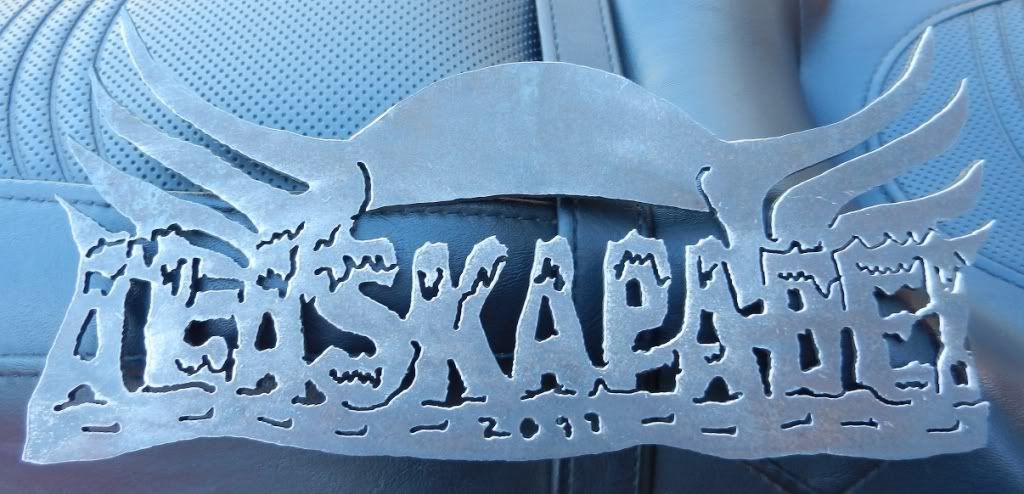This is a total geek entry. If you're seeking entertainment, This one might not be for you.
 |
| Klock Works Screen (Useless) |
 |
| ClearView Drive-In Movie Screen |
 |
| WindVest Ferry Crossing |
Up to this point, finances kept me from purchasing a new screen and I was pretty much resigned to reinstalling the drive-in movie sized ClearView for the Alaskapade. I also briefly considered a taller version of the WindVest, and then learned about a new twist on the old windscreen concept.
MADSTAD Engineering in Dade City Florida specializes in motorcycle windscreens and has a new model designed specifically for the Harley Davidson Road Glide. MadStad's founder Mark Stadnyk takes a unique approach to solving an age old problem for bikers. The MadStad system is essentially two screens in parallel, separated at precise distances and angles using specially-designed RoboBrackets. The separation between the parallel surfaces allows for an equalization of air pressure behind the main shield resulting in the airflow being directed up and over the rider and eliminating the vacuum that causes turbulence. This turbulence results in watery eyes, visors flipping up on their own, neck fatigue, and an enormous sound of thunder in a rider's helmet that becomes headache-inducing on long rides. These are all elements that I have always just accepted as a part of riding.
I installed the MadStad system on Hester and immediately liked the look. It is a very different appearance from a Road Glide screen, or any other bike screen for that matter. I know many riders who ride with the tiniest windscreen available because it looks cool and their solution to the helmet thunder is to ride without a helmet. I won't attempt to debate the helmet issue here; I choose to wear one. As for looking cool, I gave up cool when I moved up to a touring bike and placed a priority on riding comfort. Call me an old fart, but I've placed seeing over being seen when I ride.
 |
| Star Wars' Boba Fett |
The comfort versus cool debate not withstanding, one reason I chose the Road Glide is its modern look. I've never been into the classic Harley styling with leather, fringe, and conchos. I admire those bikes, but they're not for me. The MadStad wind screen system definitely looks modern and compliments the Road Glide. It sorta has a fighter jet profile crossed with cleaner version of Boba Fett's mask. Still, appearance only carries so much weight with me. With a 10,000 mile journey through a wide range of temperatures ahead, performance will be key, so I installed the MadStad system and hit the road.
The MadStad system installation is a bit more complex than your average windscreen install. This stands to reason as the system is more complex. Trust me, this is a system, not just a tinted piece of curved plastic. The instructions are thorough, but I recommend reading through them completely before beginning the install. The system arrived professionally packaged with each piece well-protected in multiple layers of bubble wrap. The kit includes tools needed to assemble the system and thorough, professionally-printed instructions with illustrations.
The short gloss black aluminum base replaced my stock screen and mounted directly to my fairing. The RoboBrackets attached to this screen provide an adjustable base for the windshield. The brackets are installed onto the aluminum base before the base itself is mounted to the fairing. The biggest pitfall with most windscreen installs is losing well nuts inside the fairing. I employed a method recommended by Chain on RoadGlide.org wherein the well nuts are partially threaded onto the windscreen screws before the screen is mounted to the fairing. Only the center hole is a complete hole, the other four attach points are slotted, making the base installation much easier for one person.
 |
| Robo Brackets on the Base |
 |
| Base & Brackets Installed on Hester |
Once the base is installed, the RoboBrackets can be adjusted to support the windscreen in a wide range of positions to meet the rider's preferences. The instructions offer setting suggestions specifically for the Road Glide. For instance, the RoboBrackets can be installed two ways, one of which will allow the screen to be adjusted much higher. Thinking traditionally, I thought taller would be better. MadStad recommends the lower setting for the Road Glide. My gut told me to do the opposite for more height, but I figured the designer knew what he was talking about and took his advice. The eight RoboBracket bolts are adjusted with a small, flat 10mm open end wrench and an allen wrench,each of which are included in the installation package. These are small enough to conveniently pack away on the bike should quick adjustments on the road become necessary. The windscreen is secured to the RoboBrackets with four T screws included with the kit. These screws make removal quick and tool-free.
 The installed system has a unique appearance that quite honestly, some might not like. I do for the reasons stated above and I think the look would grow on most people who gave it a chance. The bottom line for me is performance. I'm not a motorcycle enthusiast; I'm a rider. As such, I'm open to seriously explore any part that can make my rides more enjoyable and safer.
The installed system has a unique appearance that quite honestly, some might not like. I do for the reasons stated above and I think the look would grow on most people who gave it a chance. The bottom line for me is performance. I'm not a motorcycle enthusiast; I'm a rider. As such, I'm open to seriously explore any part that can make my rides more enjoyable and safer.So how does it perform? In two words: It rocks! Granted, it took a few runs and adjustments to dial-in the perfect placement. But once I did, I was very happy with the result. When I looked at the instructions to write this review, I realized the settings were exactly as MadStad recommended in the first place.
I had hoped for some improvement at highway speed. The MadStad system certainly delivered that, but I was surprised at the noticeable improvement at slower speeds too. The area between myself and the dash is as calm as being in the eye of a hurricane. In fact, it's so calm it's almost odd. I hit the highway and crossed a few lakes where the wind is always shifting and turbulent. The difference in the amount of wind noise was startling. Granted, I have fairing lowers, which cut a great deal of turbulence, but the decrease - even with them installed is impressive. My stereo came through loud and clear, even while playing audiobooks. The most noticeable improvement is felt while wearing my modular helmet. Half helmets don't encapsulate and resonate the sound from the wind beating on them like enclosed helmets do. This encapsulated resonance creates a thunder-like sound inside the helmet because the ears are covered. When this occurs, even the modular helmet's internal stereo speakers are rendered almost useless. I used to crouch down to eliminate the thunder when it got to me on long rides. I'm sure I looked like Quasimodo when I did that. Even though the MadStad system is shorter, the wind is still directed up and over my helmet for a quieter ride.
Final Thoughts
MadStad is on to something here. I predict others will produce similar solutions as this system gains popularity. I hope buyers remember who the originator was. Road Glide riders are known for buying multiple windscreens in search of the quietest ride. The MadStad is my fourth, including the original. Roadie owners who are considering a new windscreen can save themselves considerable time, money, and effort if they give the MadStad a serious look first. I doubt I'll ever get to compare the MadStad system to the Klock Works at 160mph, but the fart test is almost certain.
.

